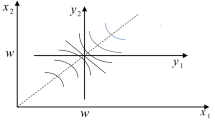Abstract
This paper discusses several concepts that can be used to provide a foundation for a unified, theory of rational, economic behavior. First, decision-making is defined to be a process that takes place with reference to both ‘subjective’ and ‘objective’ time, that distinguishes between plans and actions, between information and states and that explicitly incorporates the collection and processing of information. This conception of decision making is then related to several important aspects of ‘behavioral economics’, the dependence of values on experience, the use of behavioral rules, the occurrence of multiple goals and environmental feedback.
Our conclusions are (1) the non-transitivity of observed or ‘revealed’ preferences is a characteristic of learning and hence is to be expected of rational decision-makers; (2) the learning of values through experience suggests the sensibleness of short time horizons and the making of choices according to ‘flexible’ utility; (3) certain rules of thumb used to allow for risk are closely related to principles of Safety-First and can also be based directly on the hypothesis that the feeling of risk (the probability of disaster) is identified with extreme departures from recently executed decisions. (4) The maximization of a hierarchy of goals, or of a lexicographical utility function, is closely related to the search for feasibility and the practice of ‘satisficing’. (5) When the dim perception of environmental feedback and the effect of learning on values are acknowledged the intertemporal optimality of planned decision ‘trajectories’ is seen to be a characteristic of ‘subjective’ not ‘objective’ time. This explains why decision making is so often best characterized by rolling plans. In short, we find that economic man - like any other - is an existential being whose plans are based on hopes and fears and whose every act involves a leap of faith.
Similar content being viewed by others
References
Chipman, J. S., ‘On the Existence of Continuous, Real Valued Functions which Consumers may be regarded as acting as if they are maximizing’, mimeo, Department of Economics, University of Minnesota, Minneapolis, Minn., 1965.
Cyert, R. M. and March, J. G., A Behavioral Theory of the Firm, Prentice-Hall, Englewood Cliffs, N.J., 1963.
Day, R. H., ‘A Behavioral Theory of the Firm by Cyert and March’, Econometrica 32 (1964) 461–464.
Day, R. H., ‘Flexible Utility and Myopic Expectations in Economic Growth’, Oxford Economic Papers 21 (1969) 299–311.
Day, R. H., ‘Recursive Programming Models of Industrial Development and Technological Change’, in Proceedings of the Fourth International Conference on Input-Output Techniques (ed. by A. P. Carter and A. Brody), North-Holland Publishing Company, Amsterdam, 1969.
Day, R. H. and Kennedy, P., ‘Recursive Decision Systems: an Existence Analysis’, Econometrica 38 (1971; forthcoming).
Encarnación, José, ‘A Note on Lexicographical Preferences’, Econometrica 32 (1964) 215–217.
Encarnación, José, ‘Constraints and the Firm's Utility Function’, Review of Economic Studies (April 1964).
Georgescu-Roegen, ‘The Theory of Choice and the Constancy of Economic Laws’, Quarterly Journal of Economics 44 (1950) 125–138.
Groves, T., ‘The Team Under Varying Degrees of Uncertainty’, Working Paper No. 269, Center for Research in Management Science, University of California, 1969a.
Groves, T., ‘The Allocation of Resources under Uncertainty in a Team’, Working Paper No. 270, Center for Research in Management Science, University of California, 1969b.
Heidhues, T., ‘Recursive Programming in Agricultural Applications’, in Proceedings of the Fourth International Conference on Input-Output Techniques (ed. by A. P. Carter and A. Brody), North-Holland Publishing Company, Amsterdam.
Henderson, J., ‘The Utilization of Agricultural Land: A Theoretical and Empirical Inquiry’, Review of Economics and Statistics 41 (1959) 242–260.
Koopmans, T. C., ‘On Flexibility of Future Preferences’, in Human Judgements and Optimality (ed. by Maynard and Bryan, Wiley, New York). Also Cowles Foundation Paper No. 218.
Marschak, J., ‘Economics of Inquiring, Communicating, Deciding’, American Economic Review 58 (1968a) 1–18.
Marschak, J., ‘Decision Making: Economic Aspects’, International Encyclopedia of the Social Sciences 4, Crowell Collier and MacMillan, 1968b, pp. 42–55.
Modigliani and Cohen, The Role of Anticipations and Plans in Economic Behavior and Their Uses in Economic Analysis and Forecasting, University of Illinois, Urbana, 1963.
Radner, R., ‘The Evaluation of Information in Organizations’, Proceedings of the Fourth Berkeley Symposium on Probability and Statistics 1 (1961) 491–530.
Radner, R., ‘Team Decision Problems’, The Annals of Mathematical Statistics 33 (1962) 857–881.
Radner, R., Ch. 12 ‘Teams’ in Decision and Organization, 1968.
Roy, A. D., ‘Safety First and the Holding of Assets’, Econometrica 20 (1952) 431–449.
Shackle, G. L. S., Time in Economics, North-Holland Publishing Company, Amsterdam, 1967.
Simon, H., Administrative Behavior, 2nd ed., The Free Press, New York, 1957.
Webster's Seventh New Collegiate Dictionary, G. & C. Merriam Company, Springfield, 1965.
Winter, S., ‘Satisficing, Selection and the Saving Remnant’, Institute for Public Policy Studies, Discussion Paper No. 3. January, 1969a.
Winter, S. ‘Concepts of Rationality in Behavioral Theory’, Institute for Public Policy Studies, Discussion Paper No. 7. August, 1969b.
Author information
Authors and Affiliations
Rights and permissions
About this article
Cite this article
Day, R.H. Rational choice and economic behavior. Theor Decis 1, 229–251 (1971). https://doi.org/10.1007/BF00139569
Issue Date:
DOI: https://doi.org/10.1007/BF00139569



